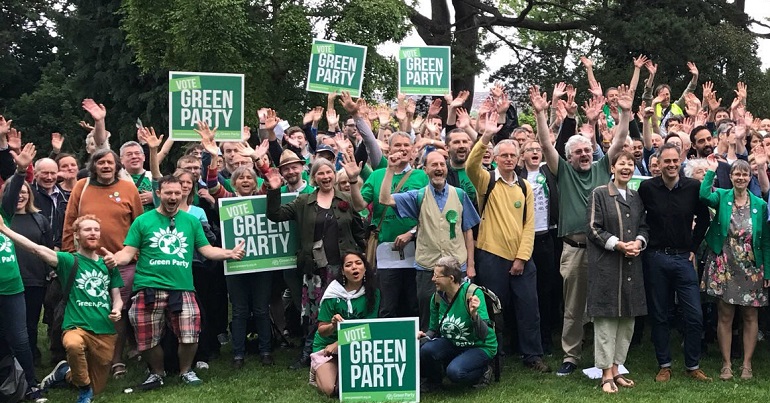The Green Party leadership candidates need to get serious about strategy

I have been working through my archive of old Green/Ecology Party materials this weekend. I have Ecology Party National Executive minutes from the 1970s, copies of Green World from the 1990s and numerous election leaflets. I am rather charmed to find a hand written and photocopied sheet entitled ‘Vote Davenport for District and parish council on polling day Thursday 6 May 1976’. John Davenport’s bid to win power in Kempsey, Worcestershire included an appeal for a pelican crossing on the A38 and demands for solar energy panels, reminding voters that the Ecology Party used to be called People. The Ecology Party became the Green Party, and today the Scottish Green Party, having become independent from the UK Greens, is about to go into government. This has made me reflect on the current Green Party of England and Wales leadership contest.
The party does have some great strengths. The Davenport leaflet, in all its scruffy handwritten naivety, shows that for decades Greens have been plugging away at the simple fact that we need to put the earth first. Climate change is literally burning the world, and while other political parties have often ignored this, Greens have been warning that we must deal with environmental problems or face disaster.
As well as environmental respect, a huge and forgotten strength of the party has been the way it has continually challenged the consensus of cruelty in British politics. Toughness is valued in UK politicians, support for nuclear weapons that can exterminate millions is very much a feature of Labour, Conservative and Liberal Democrat manifestos. Austerity that kills is seen as a virtue and the cruelty meted out to those refugees escaping war and poverty is also a feature of our politics. There are exceptions, for example, the SNP on nuclear weapons and Corbyn’s challenge to austerity, but Greens have been pretty consistently campaigning for compassion rather than cruelty. I hope they continue to do so.
However I feel the party has a largely unremarked-upon weakness. While I am aware that Green Party leaders have somewhat limited power, and that members at conference make the decisions, I hope they will convincingly address this.
The weakness is around questions of strategy. Green politics is the politics of survival. Given the huge stakes of climate change and other environmental questions, Green politics should be more focused on questions of social change, of strategy and tactics, than any other movement. Yet what I hear, and looking through my archive I see, is largely an absence and a silence.
The prevalent assumption seems to be a simple one: Deep strategic consideration is unnecessary. Greens are good, other political parties are bad. Electing Green politicians will save the world.
To what extent are there serious green strategists, the Green Lenin, or Machiavelli, or Gandhi? I don’t agree with everything that Roger Hallam says but I would give him credit for at least outlining a strategy in his recent book . I don’t see any equivalent detailed discussions of strategy coming out of the Green Party of England and Wales. Elinor Ostrom won a Nobel Prize in economics, in tackling questions of how to promote cooperation, how to move beyond traditional economics and, above all, how to build trust to tackle the nuts and bolts of climate change, she made massive contribution to practical green politics. Yet it is rare to hear Green Party politicians draw upon her hard nosed but tactical wisdom.
Equally the cruelty of our politics isn’t primarily a result of moral failure. From the operation of corporations to the message from newspapers, there are powerful forces that shape the policies that are on offer. Compassion gets attacked and cruelty is rewarded. A much more serious consideration of the forces that tend to mould politics in such negative way is necessary. I have bitter personal experience of seeing one good willed ecosocialist in the 1980s evolve into suited defender of the establishment. If we put this down to innate good and evil, the virtues and vices of personal character, we are more likely to be changed by the system than to be able to introduce systematic change.
I don’t think political change is exclusively about electoral politics. However, where Greens have gone into government, this hasn’t always gone well. A leadership candidate prepared to look at the experience of what has gone right and what has gone wrong in Green Party coalition governments would to my mind be an attractive option. How to get real political change in England is a very challenging task. Proportional representation would help elect Greens but there are plenty of other barriers, from our media to decrees from the Monarchy. In a capitalist economic system, short term profit tends to trump social justice and environmental protection. How do we build a different economy that delivers environmental sustainability? It is perhaps more complex than bringing in some monetary reform and a carbon tax.
Britain is one of the oldest imperialist nations on the planet. It is often forgotten that countries like Kenya or closer to home, the Republic of Ireland, only gained independence after rather bloody wars and conflicts. From our relationship with the US to the legacy of the City of London, imperial controls still do harm. How do we overcome this legacy and its continuing effects?
A winning Green Party leadership candidate, perhaps, will assert that they can win more MPs and point to the obvious moral failings of Labour and Tories. My hope is that they will investigate some of the more challenging and disturbing questions. Politics is a hard road, the rich and powerful tend to win. Putting Green politics into a position of real power will demand overcoming some significant challenges.
My partial approach is to work to move beyond capitalism, inspired by groups like Philly Socialists in the US, or in Wales the Valleys Underground, and at the same time to do my small practical bit as a parish councillor to implement local climate policies. I don’t feel I have the answers but I feel the Green Party needs, and this is a responsibility of both members and potential leaders, to ask the vital questions. Politics is the art of the possible; how do we make seemingly impossible demands for a world which is diverse, democratic, and ecologically sustainable possible?
In short, we need more strategising and less moralising from potential Green Party leaders.
PS. We hope you enjoyed this article. Bright Green has got big plans for the future to publish many more articles like this. You can help make that happen. Please donate to Bright Green now.
Image credit: Bristol Green Party – Creative Commons



Thanks Elise good to hear.
There is a party strategy, but Derek might not be aware of it having not been a member for some years.
Derek: I was glad to find this sentence in your article on strategy: “Proportional representation would help elect Greens…”
And I also agree with the second part: “but there are plenty of other barriers, from our media to decrees from the Monarchy.”
So while I do not claim that PR would be a “miracle cure” for the electoral woes of the GP, I do think it would be a good place to start.
Excepting two Canadian provinces, there is no jurisdiction — country, state or province —ANYWHERE in the world where the Greens have won or come second or become a serious political player unless there was and is PR voting. Without PR voting in Scotland, the Greens admit they would not have a single seat in May 2021. Ditto for New Zealand Greens.
One simple fact must be grasped: without actively campaigning for PR now, the Greens will likely have about the same number of MPs in 2040 as they have now. One. What happens in 2040? Caroline Lucas will turn 80.
Yes, electing local councillors in a country with PR like Germany can translate into seats in a national parliament. But this strategy has been a flop over the past decade for the GPEW.
The number of Green councillors has multiplied several times since Lucas was first elected in 2010. In the 2019, while Lucas was elected for the fourth time, the Greens had only two second place finishes out of 650 seats. Both were more than 25,000 votes behind Labour…and so it would be quite extraordinary to elect a second Green MP in the next election.
PR is already GPEW policy. Now is time to get out there and CAMPAIGN (the caps are deliberate) for PR, time to GET PR DONE! if we are serious about fighting climate change in the next 20 years.
FPTP creates an electoral duopoly….and one thing is very clear: the Greens are not part of that duopoly: http://getprdone.org.uk/blog-the-nearly-iron-laws-of-fptp/